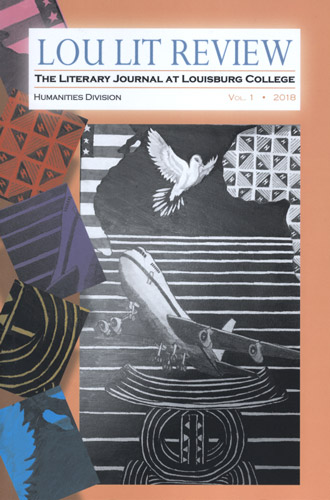Lou Lit Review – 2018
Having traveled down south on numerous occasions, I have found there is much to love about North Carolina. Lou Lit Review adds to that adoration, a new international journal of fiction and poetry published at Louisburg College. While a slim inaugural installment, with solid mentorship from the editors of Raleigh Review, Lou Lit has established itself with resounding force. As Co-editors Tampathia Evans and Tommy Jenkins express in the Editors’ Note: “Lou Lit is still ‘becoming’ and we are not quite sure what we are as of yet. What we do know is that we will continue to publish writers whose work represents the complexity of the human condition and makes us want to read on.” Absolutely.
Having traveled down south on numerous occasions, I have found there is much to love about North Carolina. Lou Lit Review adds to that adoration, a new international journal of fiction and poetry published at Louisburg College. While a slim inaugural installment, with solid mentorship from the editors of Raleigh Review, Lou Lit has established itself with resounding force. As Co-editors Tampathia Evans and Tommy Jenkins express in the Editors’ Note: “Lou Lit is still ‘becoming’ and we are not quite sure what we are as of yet. What we do know is that we will continue to publish writers whose work represents the complexity of the human condition and makes us want to read on.” Absolutely.
Both the poetry and flash fiction in this issue provide readers with great variety of style—although subject matter-wise, there was a strong focus on death and dying. This is definitely part of the human condition, yet, from what the editors note, there were “hundreds of submissions,” so this might be something to consider balancing in future issues. There is also, among all the works, a strong sense of place, which the publication notes is indeed their focus: “promoting place-based works of experience.”
A clear example of this is flash fiction “The One and Only” by Erica Hoffmeister, which intertwines micro details of place with the lives of inhabitants and travelers, opening with:
The One and Only is the only bar from Mesquite to Cedar City, hidden off Main Street between twenty-dollar motels and a gas station parking lot. In this Mormon town two hours north of the Vegas strip, we only sell beer; the whisky seeps through red clay cracks and evaporates into Utah blue air before it can make it to Kanab. It’s antiquated and desolate.
Hoffmeister’s long prepositional descriptors punctuated with the short adjectival commentary is a delight to course through, while Tristan Durst’s story “Yellowstone” offers a stream of unique sensory detail as a way of expressing both being in one place while wanting to be in another and the attitudes inherent in both:
To go back to my home, that is not this dizzying mountainous landscape full of people who say shucks and heck and drink decaf. I want sweet tea and miles upon miles of flat green land meeting the empty blue sky. I want the claustrophobic crush of a dive bar, not the fair trade organic tea cafés, part-owned by someone who used to be famous but needed something simpler. I don’t want to go to the farmers’ market, again, but to lick the taste of vodka out of strangers’ mouths, chase it with fried bar food and another stranger, and never, ever see another goddamn promise ring.
That kind of writing just makes me want to do fist pumps in the air and shout out, “Hell yeah!”
Other works present a quieter side of life and the human condition, contemplations, as in these lines from the poem “Home Base” by Travis Truax, with the epigraph, “– outside Martin, South Dakota”:
Her friend Tim grows wheat here.
Two cats, Blackie and Smoke
eat breakfast
from retired frying pans
beside the potted flowers.Morning
glares off the grain bins.All the distance
in the world
lives here, simple and quiet.
And from “Drink in the Morning” by Beth Williams, which opens:
Oars sip river water
hull swallows hard
sip swallow, sip swallow
and follows the movement of a boat as it passes by, the repetition of “sip swallow” lulling the reader into being there, hearing the “ducks, geese sing louder.” Lovely. Just lovely.
The variety continues with Success Akpojotor’s ‘math’ poem, “The Hypotenuse” which opens with the equation: , then each successive stanza is labeled c then a2 then b2 as the speaker explores his life’s trajectory through mathematical terms and theories. And Sean Buckley’s magical realism flash “ACA,” about a woman who is “cursed with sticky skin,” which her doctor calls “acquired cutaneous adherence.” As the piece progresses, we learn of all the materials that literally stick to her skin, imbedded fabric and debris, “The spaces between my toes have become a home for the shredded, fraying remains of sandal straps; I can’t get them off.” The story shifts this element into the metaphor of the character’s relationships with others and her family, including her sister, who is “the exact opposite [ . . . ]. Her skin runs like oily water, shrugging off even the most ardent clingers whether she wants it to or not.”
A truly international journal, Lou Lit includes writers who hail from Benin City, Nassau Bahamas, Croatia, and the UK as well as from coast to coast in the US. Such expanse of perspectives offers readers a global experience of exploring what it means to be human through each place—all in one beautiful printed space. Lou Lit Review has made a tremendous debut, one I hope will continue both by staying grounded in such quality while growing through quantity of content as well as readership.
[loulit.org]





